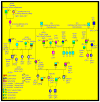Generational association studies of dopaminergic genes in reward deficiency syndrome (RDS) subjects: selecting appropriate phenotypes for reward dependence behaviors
- PMID: 22408582
- PMCID: PMC3290972
- DOI: 10.3390/ijerph8124425
Generational association studies of dopaminergic genes in reward deficiency syndrome (RDS) subjects: selecting appropriate phenotypes for reward dependence behaviors
Abstract
Abnormal behaviors involving dopaminergic gene polymorphisms often reflect an insufficiency of usual feelings of satisfaction, or Reward Deficiency Syndrome (RDS). RDS results from a dysfunction in the "brain reward cascade," a complex interaction among neurotransmitters (primarily dopaminergic and opioidergic). Individuals with a family history of alcoholism or other addictions may be born with a deficiency in the ability to produce or use these neurotransmitters. Exposure to prolonged periods of stress and alcohol or other substances also can lead to a corruption of the brain reward cascade function. We evaluated the potential association of four variants of dopaminergic candidate genes in RDS (dopamine D1 receptor gene [DRD1]; dopamine D2 receptor gene [DRD2]; dopamine transporter gene [DAT1]; dopamine beta-hydroxylase gene [DBH]).
Methodology: We genotyped an experimental group of 55 subjects derived from up to five generations of two independent multiple-affected families compared to rigorously screened control subjects (e.g., N = 30 super controls for DRD2 gene polymorphisms). Data related to RDS behaviors were collected on these subjects plus 13 deceased family members.
Results: Among the genotyped family members, the DRD2 Taq1 and the DAT1 10/10 alleles were significantly (at least p < 0.015) more often found in the RDS families vs. controls. The TaqA1 allele occurred in 100% of Family A individuals (N = 32) and 47.8% of Family B subjects (11 of 23). No significant differences were found between the experimental and control positive rates for the other variants.
Conclusions: Although our sample size was limited, and linkage analysis is necessary, the results support the putative role of dopaminergic polymorphisms in RDS behaviors. This study shows the importance of a nonspecific RDS phenotype and informs an understanding of how evaluating single subset behaviors of RDS may lead to spurious results. Utilization of a nonspecific "reward" phenotype may be a paradigm shift in future association and linkage studies involving dopaminergic polymorphisms and other neurotransmitter gene candidates.
Keywords: Reward Deficiency Syndrome (RDS); dopamine; gene polymorphisms; generational association studies; phenotype; “super normal” controls.
Figures
Similar articles
-
Acute intravenous synaptamine complex variant KB220™ "normalizes" neurological dysregulation in patients during protracted abstinence from alcohol and opiates as observed using quantitative electroencephalographic and genetic analysis for reward polymorphisms: part 1, pilot study with 2 case reports.Postgrad Med. 2010 Nov;122(6):188-213. doi: 10.3810/pgm.2010.11.2236. Postgrad Med. 2010. PMID: 21084795 Review.
-
Reward deficiency syndrome: genetic aspects of behavioral disorders.Prog Brain Res. 2000;126:325-41. doi: 10.1016/S0079-6123(00)26022-6. Prog Brain Res. 2000. PMID: 11105655 Review.
-
Neurogenetics of dopaminergic receptor supersensitivity in activation of brain reward circuitry and relapse: proposing "deprivation-amplification relapse therapy" (DART).Postgrad Med. 2009 Nov;121(6):176-96. doi: 10.3810/pgm.2009.11.2087. Postgrad Med. 2009. PMID: 19940429 Free PMC article. Review.
-
Some ADHD polymorphisms (in genes DAT1, DRD2, DRD3, DBH, 5-HTT) in case-control study of 100 subjects 6-10 age.Neuro Endocrinol Lett. 2008 Apr;29(2):246-51. Neuro Endocrinol Lett. 2008. PMID: 18404133
-
[A pharmacogenetic analysis of dopaminergic and opioidergic genes in opioid addicts treated with the combination of naltrexone and guanfacine].Zh Nevrol Psikhiatr Im S S Korsakova. 2016;116(11. Vyp. 2):36-48. doi: 10.17116/jnevro201611611236-48. Zh Nevrol Psikhiatr Im S S Korsakova. 2016. PMID: 28300812 Clinical Trial. Russian.
Cited by
-
Externalizing Problem Behavior in Adolescence: Dopaminergic Genes in Interaction with Peer Acceptance and Rejection.J Youth Adolesc. 2015 Jul;44(7):1441-56. doi: 10.1007/s10964-015-0304-2. Epub 2015 May 26. J Youth Adolesc. 2015. PMID: 26006708
-
Genospirituality: Our Beliefs, Our Genomes, and Addictions.J Addict Res Ther. 2013 Oct 10;5(4):162. doi: 10.4172/2155-6105.1000162. J Addict Res Ther. 2013. PMID: 24971227 Free PMC article.
-
FOXN3 and GDNF Polymorphisms as Common Genetic Factors of Substance Use and Addictive Behaviors.J Pers Med. 2022 Apr 26;12(5):690. doi: 10.3390/jpm12050690. J Pers Med. 2022. PMID: 35629112 Free PMC article.
-
Genetic Addiction Risk Score (GARS): molecular neurogenetic evidence for predisposition to Reward Deficiency Syndrome (RDS).Mol Neurobiol. 2014 Dec;50(3):765-96. doi: 10.1007/s12035-014-8726-5. Epub 2014 May 31. Mol Neurobiol. 2014. PMID: 24878765 Free PMC article.
-
Dopamine receptor D1 and postsynaptic density gene variants associate with opiate abuse and striatal expression levels.Mol Psychiatry. 2013 Nov;18(11):1205-10. doi: 10.1038/mp.2012.140. Epub 2012 Oct 9. Mol Psychiatry. 2013. PMID: 23044706 Free PMC article.
References
-
- Blum K., Cull J.G., Braverman E.R., Comings D.E. Reward deficiency syndrome. Am. Sci. 1996;84:132–145.
-
- Blum K., Braverman E.R. Reward deficiency syndrome: A biogenetic model for the diagnosis and treatment of impulsive, addictive, and compulsive behaviors. J. Psychoactive Drugs. 2003;32(Suppl):1–112. - PubMed
-
- Comings D.E., Blum K. Reward deficiency syndrome: Genetic aspects of behavioral disorders. Prog. Brain Res. 2000;126:325–341. - PubMed
-
- Comings D.E., Wu S., Chiu C., Ring R.H., Gade R., Ahn C., MacMurray J.P., Dietz G., Muhleman D. Polygenic inheritance of Tourette syndrome, stuttering, attention deficit hyperactivity, conduct, and oppositional defiant disorder: The additive and subtractive effects of the three dopaminergic genes—DRD2, D beta H, and DAT1. Am. J. Med. Genet. 1996;67:264–288. - PubMed
Publication types
MeSH terms
Substances
Grants and funding
LinkOut - more resources
Full Text Sources
Other Literature Sources
Miscellaneous



